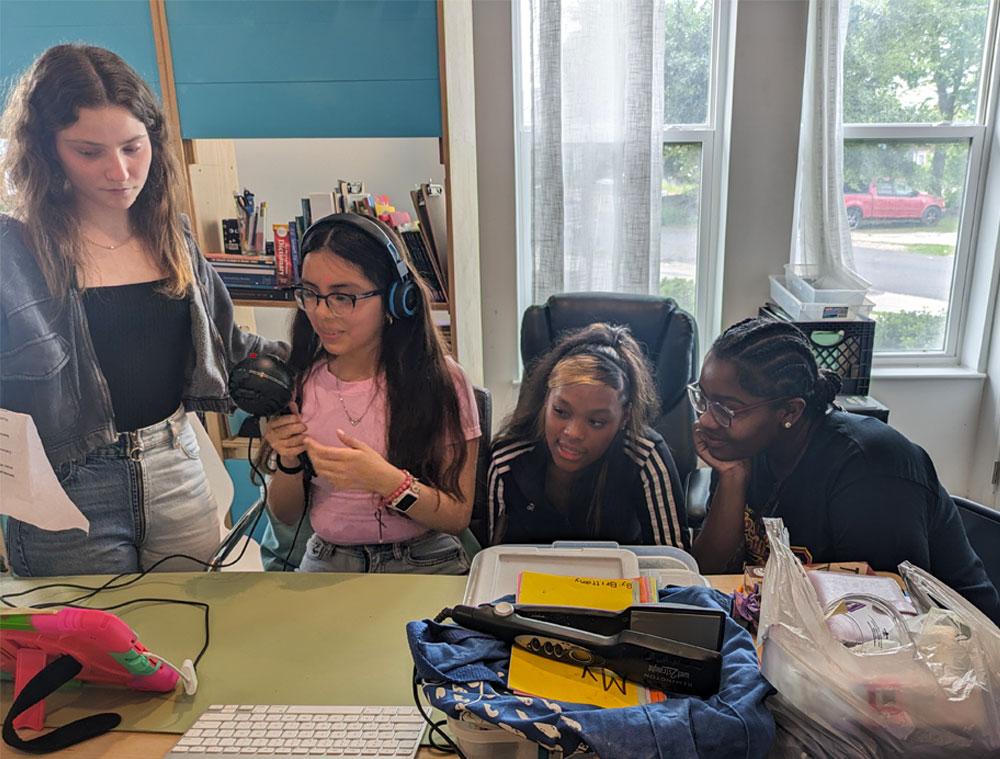Tulane research program empowers New Orleans youth to drive change in their schools
With Tulane University undergraduate psychology students serving as mentors, New Orleans middle school students are learning how to conduct research into their own lives and communities.
They’re part of the Little Researchers of Creative Change (Little ROCCs), a research initiative that empowers students ages 13 to 15 to become agents of change within their schools and neighborhoods.
Little ROCCs is overseen by the Coalition of Compassionate Schools, a program run by Tulane trauma psychologists in the Department of Psychology at the School of Science and Engineering. The coalition, which also includes other local nonprofits, trains teachers and school leaders how to best reach students who are struggling in the classroom.
During the 2023-24 school year, the Coalition trained 7th and 8th graders at ReNew Schaumburg Elementary School, ReNew Laurel Elementary School and Lafayette Academy to take on the roles of Little ROCCs by investigating such issues as negative student/teacher relationships, low student motivation and overall stress. With the support of Tulane staff and undergraduate mentors from Tulane, Xavier, and Loyola universities, the Little ROCCs developed research questions, conducted interviews and focus groups, administered surveys and analyzed findings.
This past summer, the coalition piloted a Youth Participatory Action Research (YPAR) camp on Tulane’s uptown campus, where students learned critical thinking and leadership skills along with the importance of civic engagement.
“I think YPAR is so powerful because it positions kids as the experts,” said Jesse Chanin, PhD, camp director and youth engagement fellow at the Coalition for Compassionate Schools. “That makes it an impactful intervention on service learning as well. Because the undergrads are not going there to tutor the students or address some perceived deficiency. They are going to deeply listen to the kids and partner with them to make their vision a reality.”
Through a grant from the Spencer Foundation, in addition to a Carol Lavin Bernick Faculty Grant, the Coalition for Compassionate Schools will bring the Little ROCCs program to three new schools in the 2024-25 school year, providing 18 more students with the opportunity to learn youth participatory action research techniques.
Students at KIPP Leadership Academy, Esperanza Charter School and Foundation Preparatory Academy will be supported by a new cohort of undergraduate mentors from the three partner universities. The Tulane mentors will receive service-learning credit through the Center for Public Service.
“Teachers and school leaders read about trauma and the importance of trauma-informed practices,” Chanin said. “But it just hits differently to hear it coming directly from students. We hope the Little ROCCs’ work will inspire schools to take the concerns of their students seriously.”
J’Lyn Wilson, a recent Tulane graduate who is now in the 4+1 Psychology Master’s program, described the camp as a transformative experience for students as well as herself. “The students are actively using their newfound knowledge to fuel their empowerment and advocate for positive change in every space they enter,” she said.
Students transformed their research findings into a 30-minute professional development seminar titled “What Students Need,” which they plan to facilitate throughout the Orleans Parish school district to help teachers and school administrators better meet the social and emotional needs of their students. Chanin said this data is especially crucial in Orleans Parish, where students have a posttraumatic stress rate over three times the national average.
The camp culminated in student-led presentations where the Little ROCCs showcased their professional development seminar and proposed actionable solutions to school-based issues. Among those in the audience were parents, caregivers, undergraduate mentors and other facilitators.
“Adults can get a better understanding of students through our presentation,” said Jerrhonda Smith, a youth researcher and rising 9th grader. “It can help them really hear what students are saying.”

